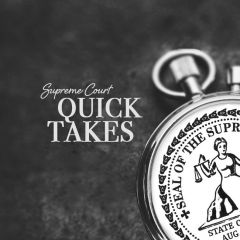Justice David K. Overstreet and the Illinois Supreme Court have announced the recall and assignment of the Honorable Mark H. Clarke (ret.) to the Fifth District Appellate Court.
Judge Clarke is being assigned to fill the vacancy created by the upcoming retirement of Justice James R. Moore, effective December 31, 2025. The assignment of Judge Clarke is effective January 27, 2026, and will conclude on December 4, 2028.







